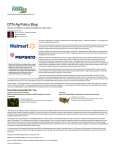Judge tosses lawsuit accusing Whole Foods of understating sugar in yogurt, but says plaintiffs can amend it

However, the retailer is not off the hook just yet, as US district judge Sam Sparks said the plaintiffs could amend their complaint for a third time (by March 4) in order to address the testing protocol issue.
The 11 lawsuits – which have been consolidated – rely on data by product testing organization Consumer Reports, which suggested the yogurt contained 11.4g sugar per 225g serving, almost six times the amount (2g) listed by Whole Foods on the label.
The low sugar level listed on the label “raised eyebrows because it is much lower than competitors, which generally range between 5-10g of sugar per serving”, argued the plaintiffs.
If the sugar level was in fact far higher than labeled, this was particularly concerning for diabetics, who need to monitor their sugar intakes closely, added the plaintiffs.
When the cases were first filed, Whole Foods told FoodNavigator-USA that its yogurt was “tested by a reputable third party lab using FDA-approved testing methodology”, but as Consumer Reports was a “trusted publication”, it was “looking into why their results differ from ours”.
Is it feasible for the plaintiffs to conduct new tests now?
Sugar content statements on nutrition labels violate the FDCA (the federal Food, Drug & Cosmetic Act) if they exceed the actual sugar content by more than 20% as determined using testing methodology defined by the FDA (based on a composite of 12 subsamples taken from 12 randomly chosen shipping cases).
However, the plaintiffs relied solely on data from Consumer Reports, which only analyzed six samples from six different lots, and did not meet the criteria set out above, said Judge Sparks, who urged the plaintiffs in his Feb 12, 2016 order to “obtain the test results from a third party or otherwise conduct testing in compliance with FDA regulations themselves”.
If the plaintiffs could not conduct new tests because the batch of yogurt in question had been destroyed by Whole Foods, however, they were “welcome to address the spoliation arguments that would inevitably arise if the litigation were permitted to proceed”, said the judge.
Spoliation refers to the intentional, reckless, or negligent withholding, altering, fabrication or destruction of evidence relevant to a legal proceeding.
Whole Foods declined to comment on the order.
*The case is: 1:14-mc-02588-SS in the US district court for the western district of Texas, Austin division.


















